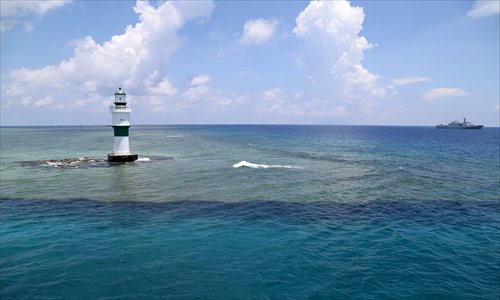China-Philippine economic ties damaged by US interference
Economic ties have greater potential without interference: analysts

This photo taken in May shows a lighthouse on reefs in the Nansha Islands. Tensions have been rising over the South China Sea disputes as a UN arbitration ruling initiated by the Philippines is about to be announced on Tuesday. Photo: CFP
Trade and economic cooperation between China and the Philippines have great potential and both countries should overcome political obstacles and interference from outside nations for their people's best interest, analysts said.
The arbitration tribunal in The Hague is set to announce its decision on the South China Sea case on Tuesday.
"The Philippines should avoid being used by the US for its pivot to Asia strategy as it hurts the Philippines' interests. The arbitration was a mistake made by the former regime and Duterte has a chance to fix it and bring better economic relations for the people of both China and the Philippines," Shen Shishun, an expert on Asia-Pacific studies at the China Institute of International Studies, told the Global Times.
According to data from China's foreign ministry, bilateral trade volume between China and the Philippines reached $44.42 billion in 2014, an increase of 16.75 percent from the same period the previous year.
Shen said that imports from the Philippines consisted of agricultural and fishery products. Due to the US pivot to Asia strategy, former Philippine President Benigno Aquino III changed the country's policy toward China, and Aquino's provocative policy harmed economic ties between the two sides.
Imports from Philippine slid to $18.23 billion in 2013, a decrease of 7.2 percent from 2012, affecting many agriculture products, such as bananas.
Rod Kapunan, a columnist from Philippine newspaper The Standard, told the Global Times he believes President Rodrigo Duterte will have friendlier policies toward China than the Aquino regime, and that he hopes some old projects would restart and start new ones as well.
"The railway project once offered by China could have been a good opportunity," he said, adding that infrastructure, such as telecommunications, would also present opportunities for bilateral cooperation.
In November 2015, Japan signed a $2 billion loan agreement with the Philippines to partially finance and reactivate the frozen North-South Commuter Rail Project (NSCRP) which was originally offered by China, according to a Manila Times report.
China needs to build better relationships with local NGOs and improve project transparency in future cooperation, suggested Xu Liping, an expert on Southeast Asian affairs at the Chinese Academy of Social Sciences.
The Philippines has a huge demand for infrastructure, and compared to the US and Japan, China has many advantages, such as funds, technology and experience in this area, Xu said.
In a May article, Inciting to War with China, Kapunan wrote, "We opted to initiate our version of the Cold War, which effectively denied us to share in the economic prosperity that China could offer through economic development assistance. In fact, some members of the ASEAN have already taken the approach of building stronger ties with China, consistent with the view that neighbors should cultivate friendship rather than heighten instability and insecurity. This could only open the door for the US to divide the countries of Southeast Asia."
Growth areas
Media reports present Philippine real estate as an investment haven where the Chinese are beginning to develop an interest in.
Patrick Steinmann, director of sales at Century Properties in Manila, told the Chinese Business Network last year that there is a rising trend of Chinese buyers. He said that the return on investments in the Philippine real estate market can reach as high as 8 percent.
Li Kaisheng, an associate research fellow at the Shanghai Academy of Social Sciences, told the Global Times that it is a challenge for both China and the Philippines to talk about how economic and trade relations can develop after the arbitration result comes out. He said the tensions have already hurt economic relations, with no new projects since the last few were suspended, including the railway.
There is more interaction on the grass-roots level as well. According to data from the Philippine Department of Tourism in June, during the first five months of 2016, 285,000 Chinese tourists visited the Philippines, an increase of 81 percent compared to last year's figure. In May alone, there were 47,000 tourists, a 48.5 percent increase from April.
Shen said many countries are trying to attract Chinese tourists, and geographically, the Philippines has the advantage, and if both sides reach agreement on direct cruise links between China's Hainan Province and the Philippines, there would be a huge potential for the tourism industry.
Newspaper headline: US hurts Philippines’ interests